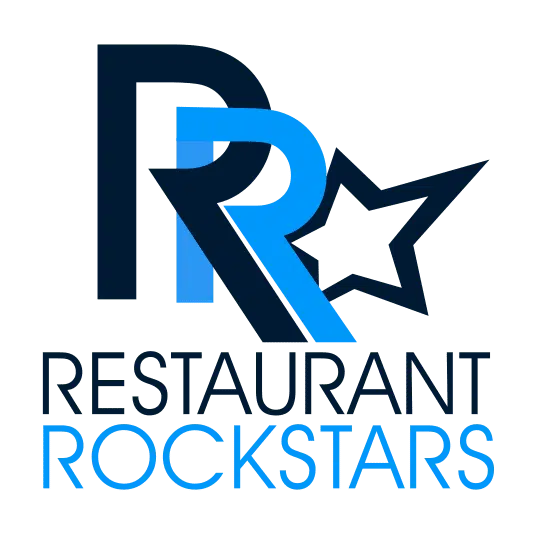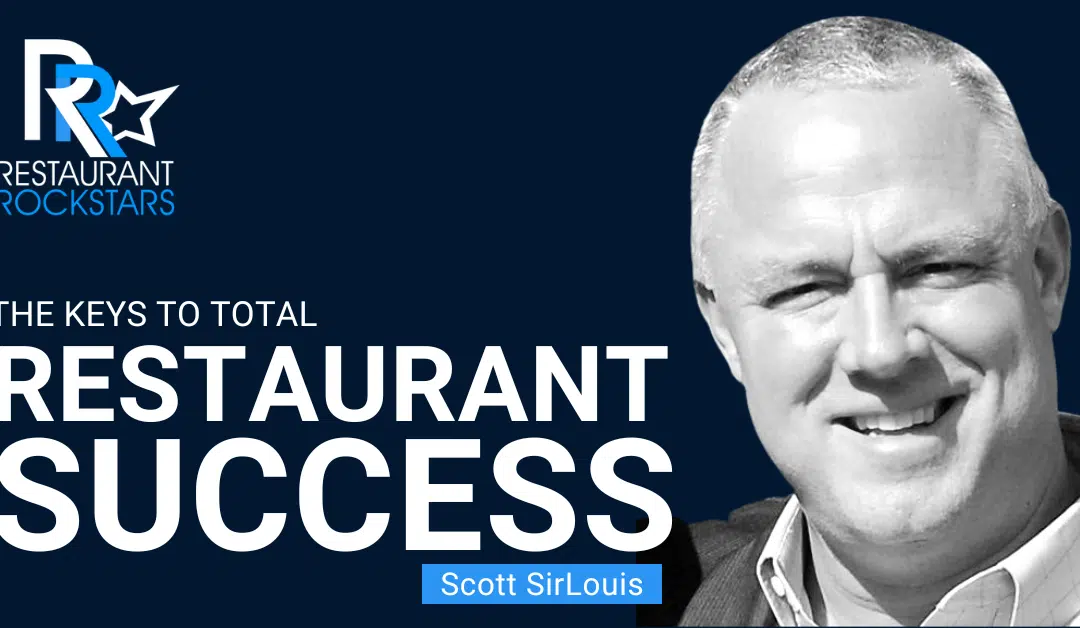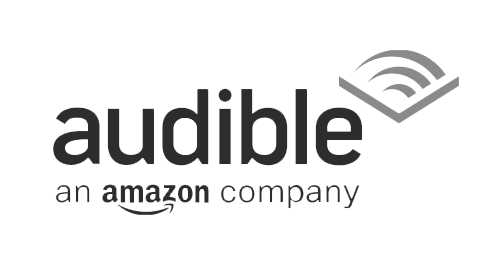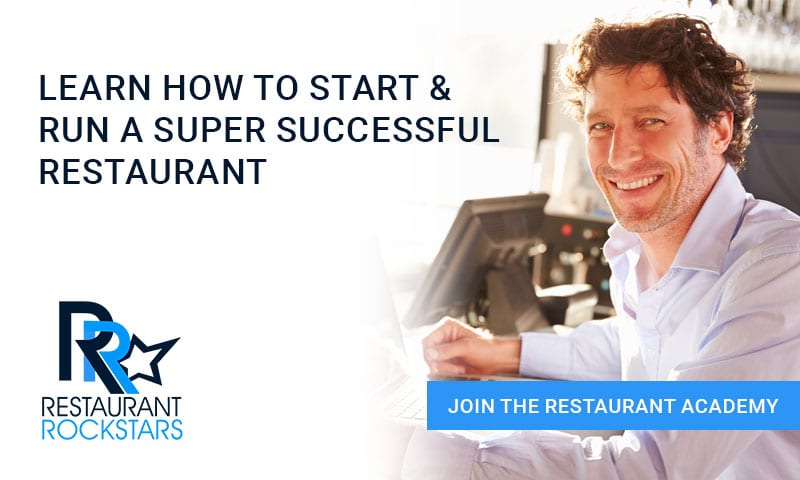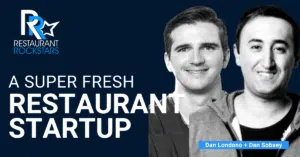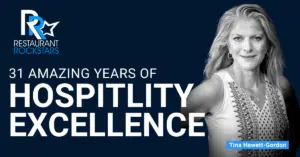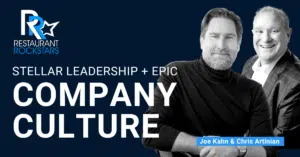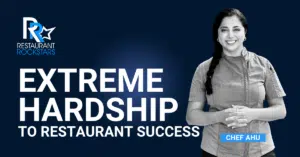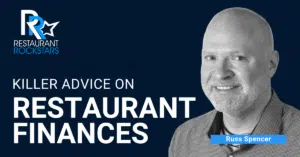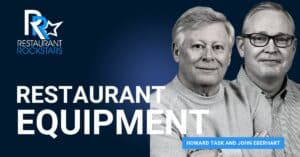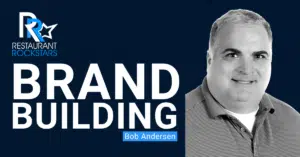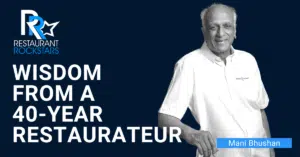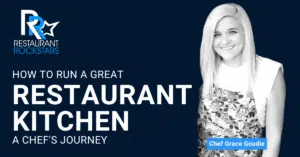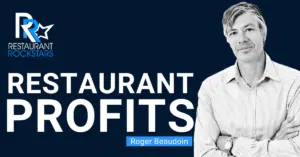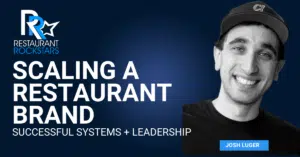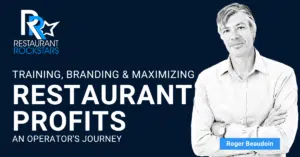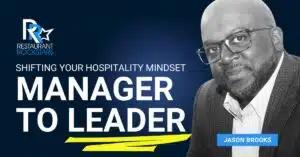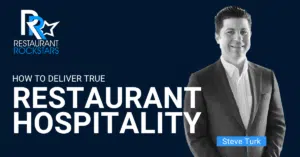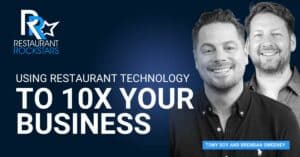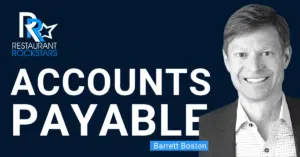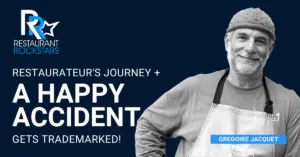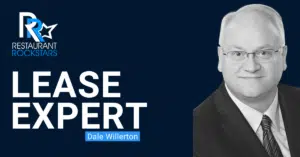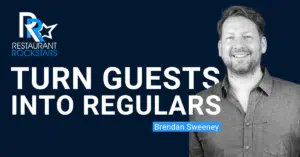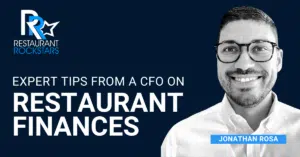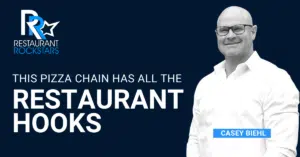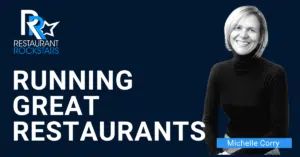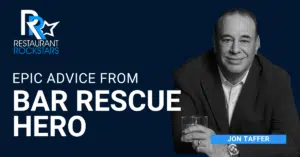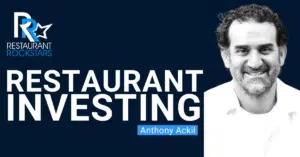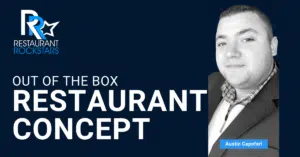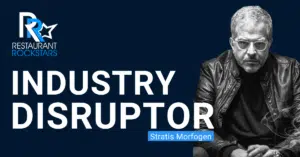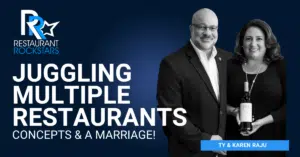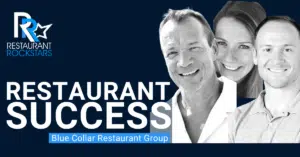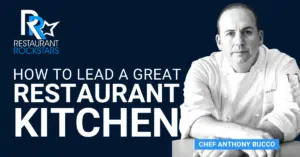Restaurant Rockstars Episode 327
The Keys to Total Restaurant Success
LISTEN HERE OR ON YOUR FAVORITE PODCAST PLAYER
Prefer to watch the interview?
Click the video below.
There is a magic formula to true restaurant success, and it’s all in this episode. Settle in, take notes, execute and then watch your guest counts rise and your cash register ring!
In this episode of the Restaurant Rockstars Podcast, I’m speaking with Scott SirLouis of FSC Franchise Co. He is a veteran operator, franchise team builder and all-around restaurant guy.
Don’t miss Scott telling us:
- What a true passion and a feeling of hospitality inspire your team forward
- The importance of understanding and diligently tracking your financial controls and key performance indicators
- Understanding and feeling what the guest experiences in each location
- How your leadership approach impacts the guest experience
- What it takes to innovate, stand apart and win big over the competition
- Why future economic conditions require your operation to capture increased market share
- How your operating culture is the key to restaurant success
Follow Scott’s best advice then go out and Rock YOUR Restaurant!
Best of Success!
Roger
Connect with our guest:
The Brass Tap social media:
https://www.facebook.com/BrassTapBeerBar
@the_brass_tap (Twitter)
the_brass_tap (Instagram)
Beef ‘O’ Brady’s social media:
https://www.facebook.com/BeefsHomeOffice
@BEEFOBRADY (Twitter)
beefobradys1985 (Instagram)
0:00
Having a sense of joy and taking care of people is is key to the industry. And that’s really what got me into. This is a penny business. Lots of people think they can run restaurants and be successful at it. Because plenty of doctors and lawyers and tech professionals and so forth, sit in dining rooms and say, This looks like fun. I can do this. And it is it’s a lot of fun. And it’s not intellectually challenging. It’s it’s good service, good food, good atmosphere. Everybody kind of gets that, but it’s executionally challenging.
0:37
Welcome back. Thanks for joining me once again on the restaurant rockstars podcast. So glad you’re here. Today’s guest chief operating officer of a large franchise company, his name Scott SirLouis, he’s going to talk all about his career trajectory, all the key learnings along the way to running a strong business, we’re gonna dive into two really dynamic concepts and it’s all about teamwork, respect it culture. It’s about financial controls, maintaining margin staying on top of your business, but of course the important elements all come down to consistency, fantastic service, treating everyone like that the most important customer and that all important loyalty. This company does it all. Well, again, so many key learnings you’re not going to want to miss so stay tuned. Thanks also to the sponsors of this week’s episode Whirks, Smithfield Culinary, The Birthday Club and SRV the hospitality training app. Thanks for being with us. Stay tuned. You don’t want to miss this episode!
1:38
You’re tuned in to the restaurant rockstars podcast powerful ideas to rock your restaurant. Here’s your host Roger Beaudoin.
1:53
restaurant owners and managers Listen, it’s not too late to claim your employer retention credit, but you have to act soon. If you haven’t heard of this, your business can receive money back from the IRS money you’ve already paid in payroll taxes. Nothing you do today is more important. Now this is free and clear cash that your business is owed by the government, the ERC program is available. If your operation had 500 employees or less, you had to shut down or partially suspend your business, or you had at least a 20% decrease in business due to COVID 19. During any quarter of 2020 and the first three quarters of 2021. Now your business can get up to $7,000 per employee per quarter for 21 and up to $5,000 per employee in 2020. Now if you have just 10 employees today and meet the requirements, you can receive up to $260,000 back in a refundable tax credit that you don’t have to pay back. Now the faster you apply, the quicker you get the money but you must do it soon. You can use the money for any purpose payroll cost of goods, business improvement or other expenses. Again, you don’t have to pay this money back now works as a company that will do everything for you to get the money that you’re owed. Now I’m speaking from experience with Whirks. My restaurant receives big checks in all available quarters and works people and process made it easy for a no obligation consultation. Click the link in the show notes to this episode and speak to them with no obligation. You pay nothing until they get you the cash.
3:33
At Smithfield we know that to meat lovers a great serving and their favorite cut is so much more than just food. It’s an experience. One that keeps them coming back to your operation again and again. That’s why we’re committed to offering you the perfect protein for every dish every day part. turn to us for the most comprehensive portfolio of pork products such as bacon, ham, sausage and more. Plus a variety of fully cooked beef and chicken. With Smithfield products, you can create delicious meals from traditional menu items to globally inspired dishes, all designed to satisfy the insatiable appetites of your hungry carnivorous patrons. What’s more, we do it responsibly. With full transparency and traceability from our farms to your kitchen. You can always be confident that when you partner with Smithfield, you will serve what you love, and your customers will love what you serve. Find your perfect protein with Smithfield. For more information or to order products visit Smithfieldculinary.com/smithfield.
4:39
Welcome back to the restaurant rockstars podcast. Glad to have you here. Scott, how you doing today? Welcome to the show. It’s so good to have you.
4:47
Well, it’s great to be here. Thanks for having me. I’m uh, I’m looking forward to our conversation.
4:51
I am as well you know, it’s really interesting that I get to talk to so many people, so many dynamic personalities in the hospitality The space and I’m always interested, our audience is always interested in their backstory, and where hospitality really began for them. So I’d like you to answer that question. And then once you do, let’s talk about your career trajectory and all the things you’ve done in the hospitality space. Sure,
5:17
that’s a that’s a really great question. Because I asked the same question of potential franchisees, when they come in, I think that how you get into this industry is key to success in it, and I came to it. At a young age, I was a child of a single parent, and my dad had to work a lot. And I ended up taking care of my brother and cooking and making meals throughout the days from a very, very young age. I mean, going back all into 11-12 years old, in high school started working at at my girlfriend’s brother’s restaurant. So that was my first job in the restaurant industry. And I think having an a sense of joy and taking care of people is is key to the industry. And that’s really what got me into it.
6:05
So you knew from a very early age that this just lit you up, this is what you wanted to do. You got some early experience, it’s so many things, really, you know, it’s the camaraderie of the of the people that you work with. It’s, it’s the relationships with the guests. It’s the fast paced dynamics of the business, it’s the love and passion for sharing good food and drinks. And just great times with people, it’s so many things. And you know, my first job as a dishwasher at a country club, I was quickly promoted the bartender. And little did I know that hospitality would shape the rest of my life. But I’ve told this story before, it was so interesting. I worked at a private country club, and the members were professionals. They were doctors, they’re lawyers, they were business people. And obviously, they threw a lot of money at me just because I naturally wanted to please it was a point of pride for me to deliver great service, even though no one trained me to do so. And yeah, I made a lot of money was really lucrative. But it was the foundational element of what I later did as a career that I couldn’t have predicted back then. So there’s some special so there’s, there’s special qualities about people that get in in this business. And obviously, in your business. These are the types of people that you look for. So thank you for sharing. So let’s talk about careers. Now. Let’s just say you, obviously, you worked for that restaurant and a series of restaurants but then professionally, how did you develop your career in hospitality and what did you do?
7:37
So after graduating, I went to graduate school and after I got out, ended up with a job in a really good corporate training program with Brinker international now Brinker? Sure, they have a great foundational set up for young people and young managers that want to get into the field. From their series of independence, as my wife and I relocated across the country, until, in Cincinnati, I started a concept of my own. It was a as me and my partner described it, we thought we’d do a Mexican subway, where you make burritos, and they build them as they come down the line. And we thought we were brilliant, until we heard that some guy in Denver had the same idea and ended up doing a considerably better job at it than we did.
8:34
Timing is everything.
8:36
Right? We did that for five or six years and had some success and then had some failures and learned a lot of lessons. Ended up getting out of that and spent a long portion of my career with a fast casual brand called facilities out of Lexington, Kentucky, worked for a series of of great bosses and great CEOs finishing up with Carl Howard, who recently retired as the CEO of facilities left there a little over five years ago, for the opportunity here at FSC. came on as the chief operating officer here. Again, working for a great CEO Chris Elliott, has been a privilege to learn from Chris and we’ve had a good run for five years and hopefully, hopefully for a long time to come.
9:23
Excellent. So there’s a lot of history there. There’s a lot of key learnings along the way. Before we get into that, you know, let’s get into you personally. Obviously, you’re a busy guy, but everyone has passions or hobbies outside their vocation. What do you like to do when you’ve got free time? Is it family? Is it golf? Is it skiing? Is it tennis? Is it gardening? What do you do if you have free time?
9:48
Sure. Well, it’s it’s family. First and foremost, I have four children, while two of them not you know live away from home in different places. Now you’re still very involved. With our kids, my wife and I traveled to see him frequently. And then when I’m not doing that, I’m a hands on guy. So, you know, I tend to do a little woodworking, I do a little painting, those sorts of things. So I like the I like being a maker and making things versus going out and buying
10:23
to creativity thing as well. So what’s a talent? Did you self develop that talent? Or did it all start in like middle school with woodshop? Or something like that? I mean, I took that class, I think lots of us did.
10:36
You know, I don’t know if I thought of town, but But I enjoy it. fairly self taught? No, no professionals involved.
10:47
Alright, let’s get back to your career. On the road to where you are today. Would you say? Or could you answer what key learnings led to this as the successes that you’ve achieved? Like? What were those things that really stand out that you follow that really helped you develop your career and become successful?
11:06
I think there’s, there’s really two things to answer that question. And I learned the first as an owner, and that is that this is a penny business, and the devils in the details, for sure. I share with with our prospective franchisees that lots of people think they can run restaurants and be successful at it. Because plenty of doctors and lawyers and tech professionals and so forth, sit in dining rooms and say This looks like fun, I can do this. And it is it’s a lot of fun. And it’s not intellectually challenging. It’s it’s good service, good food, good atmosphere. Everybody kind of gets that. But it’s execution really challenging. For sure. The devil is in the details. Whether it be you know, how burger in our business? How is a burger built to visit? Is it done in the right sequence in the right order? And all of those sorts of things down to you know, are you watching your linen bill every week or every month. So it’s a very detail oriented business. The second thing that I think is really foundational to success in the industry is you’re only as good as your team. And you know, that’s a bit cliched, and everybody can say that. But I think those who have been truly successful in the industry are people that get that at a fundamental level. And they make sure that first and foremost, their job is to hire a great team and develop a great team around them. And then after that, things get a lot easier. So that those are the two kind of really key pieces, I believe, to success in this industry.
12:52
Let’s talk about business acumen and what part that plays because I totally agree with you. Okay, one, this is a business of 1000 details for sure. And you’ve got to have the big picture at 30,000 feet, you’ve got to be a leader of people. You got to surround yourself with some people would say people better than myself or who are better at certain things, but you surround yourself with great people. But if you’re a leader, you can achieve tremendous amounts. My personal story is my mother went to business school, I went to business school, I developed the that sort of mindset or thinking about how to approach starting a business running a business, all that and you’re dealing with lots of people who are interested in your franchise that are your concepts, I should say, and some of which may have run lots of businesses before. Some of them may not have that, but they have other qualities and characteristics. That must be really a challenge perhaps or do you know instantly, this person’s got the right stuff, or that person may be potentially successful? How do you make those decisions?
13:55
So when we’re looking at franchisees, first and foremost, we’re looking for that that spirit of service that that you’ve talked about earlier, and I’ve heard I’ve heard it called having the heart of a servant. And yet, you have to genuinely want to go out and please people as part of your daily life, because in our business sales solves everything. If you truly are taking care of your guests and your and your employees, you’ll have the sales. I mean not to be trite about it, but after that almost everything else can be taught. And as a franchisor. We have a number of powerful tools that we make available to our franchisees to help them manage those details that I talked about. But if a prospective franchisee or a prospective restaurant tour doesn’t have that genuine spirit of hospitality that will allow them to drive sales It doesn’t matter how much business acumen they have, or how much I teach them about controlling cost of goods, or how many tools we give them to control, you know, other controllable expenses, they won’t be successful because they won’t be driving the top line.
15:20
I totally get that. That’s, that’s tremendous. Okay, let’s dive into what FSC franchise CO is all about. But first of all, tell me about the history of the brands and where they began and, and what the vision was, and who brought them to life and all that kind of stuff in and how, how back in time, they both started obviously different times. But tell us the history of both brands one at a time. It’s fine.
15:45
Sure. So in FSC, we have two brands. Our largest brand is called Beef O’Brady’s and it is a legacy 38 year old brand now started here in Tampa, Florida. It is a family sports pub. So the original owners started built it up to five or six units began franchising the franchise very rapidly for a long time. Like a lot of early startups, particularly in our industry, they got into a little bit of trouble, maybe got over their skis a little bit and expanded pretty quickly, that they didn’t necessarily have the infrastructure in place to support all that franchising. So in in 2008, the ownership group left the organization and private equity came in and brought in our current CEO, Chris faciliate, who has done a nice job of getting the brand back on track, back to where you’re positive that unit growth and 10 out of 12 years positive sales comps, all those sorts of successes that have been good. What the brand is, is, I’m passionate about our before Brady’s brand, I think it’s a fantastic brand. When I first came here, I had people in the industry, you know, tell me, I can’t believe you’re going to a casual dining brand casual dining is in decline, and so forth. And I said, Yeah, but there’s something special about this before Brady’s brand. And what it is, is that beef is a is a brand that is embedded in the community. And it’s different than some of our large chain competitors, that maybe have a location on the outline of a shopping mall or so forth. Most of our locations are in small, usually grocery store anchored plazas, in neighborhoods. And it’s the kind of place where where guests come in all the time. Because the owner knows them, they walk in the door. And they know half the people in the in the place their kids know the family at the other table, because it’s their friends and neighbors in that community that are that are in beeps. And that shows in some of our consumer data. We have an incredibly high frequency, particularly on Monday through Thursday. Because we’re an everyday use occasion, Brady’s if it’s if it’s mom’s birthday, you might not be taking her out to be for Brady’s on Friday night for her birthday, although I think you should we have lots of great opportunity for you. But, but people come in there after Wednesday night soccer practice, or on Mondays after whatever’s going on at their kids school. And it’s, it’s that, that opportunity for a family to be together in a comfortable environment where everybody can get good value food at a good price, and be around their friends and neighbors and in their community. So it’s really a unique brand.
19:01
You know, you’re bringing that TV show cheers to mind here where you’re greeted at the door by the owner and people want to go over and knows their name. And it’s just this family community thing where like you said it’s a it’s a repeat place. It’s your place. It’s where you feel most at home, you see your friends, you see your neighbors you see, you know your kids friends, right? That’s, that’s, that’s powerful stuff.
19:24
It is and everybody wants to be chairs, right? Ever since chairs on TV, every restaurant says, Okay, that’s what I want to be but thieves really has that. I mean, internally, we have some training programs that we call it, it’s your favorite place, and how does beefs become your favorite place? And so that’s really key to that concept. Our other brand was started also here in Tampa by a couple of people Brady’s franchisees in it is started off originally as a craft beer bar. So 60 different craft beers on tap. And the original concept was was a craft beer bar and cigars. At the time craft beer was was really hot and the brand did well. We’ve since evolved that brand as we’ve honed it into now, we are we think we offer a craft experience in a lot of areas. Yes, we still have craft beer. We have educated servers and bartenders, and we love to have people come in and explore the world of craft beer. But we also have a great liquor program. We have barrel aged, Bourbon cocktails that we sell, we have a great food menu of shareables, and pizzas and burgers and things that are elevated bar food, to maybe use a term, almost a gastropub type of concept. Very much a social gathering place, lots of large community tables, people come into groups, to watch a game, we do lots of activities, trivia nights, and music, bingo, and all those sorts of things. So very much a social place. And that brand is called the brass tap, we’ve had a lot of success with it is it is our growth brand is expanding very rapidly in particularly in the last two, three years. So we’re we’re excited about where that brand is going.
21:23
You know, what you just described for the brass tap is what I call the clubhouse formula. And it combines everything that you would want to spend time in a place that is so social, as you mentioned, we talked about live music, you got 60 Plus taps of beer, you’ve got what you would describe as sort of opera leveled pub food, right? It’s very nice menu compared to a typical beer bar type thing. You’ve got sports on TVs, you’ve got like you said, bingo, I think handcrafted cocktails and barrel aged bourbons. And it’s like so much for so many different people, what a gathering spot that must be in it. It’s so close to my flagship concept in terms of what you offer the people, you know. And I always believed in what we called the amusement park formula, where every year you need a new ride to keep people coming back for more. So the brand doesn’t stay stagnant. It continues to evolve, the core foundational elements will always be there. But you’re always thinking up new things that capture the guests imagination and keep them talking in the social media buzzing and all that kind of stuff. So that’s what I’m guessing is going on there. Can you talk about let’s talk about, take your SEO hat off for a moment Scott and put yourself in the guest shoes, walking through the door of both concepts for the very first time, describe the sounds, the smells, the vibe, the ambiance, like what hits you, what strikes you the most about each concept from a guest point of view?
22:56
Sure. In the beef of Brady’s brand, it’s, it’s absolutely gonna be that you walk in the door, and you’re welcomed. And you look around and you see somebody you know, or the owner is coming up to you and saying, Hey, how you doing? Welcome. Come on in, grab a seat, you know, what can we get you those sorts of things. It’s it’s a really informal, but very engaging style of service from from the server. You’ll look around, and you’ll see everyone else in the place visiting other tables because they again, they know their neighbors, they’re excited to watch and get together and watch the game on a Monday night or Thursday night or so forth. In our best tech brand. It’s it’s you walk in and you feel the energy. There’s groups of tables, and people are laughing and having a good time. It’s the knowledge of the server when they walked over to your table, and they hand you the tap list with 60 different beers on tap over 300 in the bottle, and begin to offer you that that advice on what do you usually drink? What do you try? We love when somebody walks into our brass tap bar and says, I just want to Bud Light. Because then it gives our observers an opportunity to say, Absolutely, I can get you a Bud Light. But hey, if you want to let me turn you on to this other beer that you might really love. And it’s like a gateway beer into craft beer for somebody that just drinks Bud Light. Nothing wrong with selling Bud Light, we sell a ton of Bud Light. But we’d love the opportunity to also kind of bring people in and give them something that’s like what they’re used to. But with a little a little twist or maybe a little more flavor or a little more body or something that they get them to say wow, that is really good. I’ve never had a team like that before. And that’s really what you see when you come into progress to bring that
24:55
what you’re describing is it starts with true Hospitality it starts with product knowledge. And it starts with people having a true desire to serve the public, right. And then through that product knowledge, making suggestions that you know, the guests will enjoy and appreciate turning them on to something new, which up levels, the guest service experience, I call it amazing dining experiences when someone can literally walk somebody through a dining experience and make lots of suggestions. And people are usually open to that, when they go out to eat. It’s like they want to be entertained. It’s more than just I’m hungry. And it’s time for dinner. And I didn’t feel like cooking. It’s really about taking people on this, I call it the magical journey. And, and the key people on the front of house that interact with the guests, whether they’re the host greeting people at the door, or even a bus person or a back, wait, that’s clearing the tables, if everyone has that knowledge. And if everyone is interacting with the guests and treating each individual guests like the most important person in the place, they feel special, and they’re more inclined to take those suggestions. And then when they really enjoy what was suggested. They’re going to turn all their friends on to it. So that’s a beautiful thing. And I’m glad you really touched on that. Let’s talk about the brass tap experience. Now walk me through the doors a guest
26:12
Yeah, so again, as the brass tap, it’s all about what you just said, it’s about that knowledge about about the beer. It’s about somebody walking in and saying, Can I just can I get a jacket and coat? And again, we say absolutely we can do that. But have you tried one of these other great bourbons or whiskies that we have beyond the bar are these barrel aged cocktails you normally drink Manhattan’s let me tell you, you’ve got to try one of these barrel aged Manhattan’s we make it we put it in a small barrel aged for a minimum of 120 days. And it really does bring up nuances in the drink. So it’s it’s exactly the type of thing you just talked about. It’s that product knowledge that is really important to the brass cap concept. We spend a lot of time and effort on our servers and bartenders in particular, we send them to what we call beer school and cocktail school. And it’s a long training program to help them understand what could they suggestive sell, what are the types of things that go into the flavor profiles on these various products. Because as you said, really important, people can go and buy craft beer at a garage or at a gas station these days, you can go anywhere and get food. That’s not what coming into a brass tap is about coming into a brass tap is about the experience. It’s about engaging with your friends and with the servers that we have in our in our restaurants and bars. And, and walking out of there feeling like I got more than just a couple of drinks and in a pizza.
27:50
So I’m up here in New England, and obviously for the past so many years, Tom Brady was the thing, right? And now he’s like this Tampa phenomenon, although the other night may not be representative or maybe of his future. But have you found that sports have been a huge draw that drive people in and it’s been great for business in general.
28:13
It is, we we put a lot of emphasis on having a good TV package. Or not, we’re not a purely a sports bar, like some of our big national competitors. But we have we do have good TV packages, AV packages and all of our stores, we run specials, particularly during NFL season, to draw people in to, to watch the games. But again, it’s a it’s a social environment as much as anything people are coming in in groups to watch the games, the game is on TV, and slowly that might that might be what brought you in. But really what makes the experience is the people you’re with your friends or your family. And then the the engagement of the server and the staff in the store. Because lots of lots of restaurants have TVs these days. That’s that’s almost table stakes. To have it on for people to come in. But it’s what you do after that, that really drives the drives loyalty and repeat business. Right? I
29:18
mean, you’re feeling like the team, your staff team that interact with the guests or really make making people feel like the regulars even if they are first time visitors you get caught up in the you know, the social aspect of things. People are super friendly. You’re meeting people you never met before and suddenly you feel like you’ve been coming to this place forever, even if it is your first visit and I think that’s a very powerful thing as well.
29:43
Yeah, I’ll tell you it comes through in our social media comments. So we we look at all all social comments, all reviews that come in from multiple platforms. Every store gets a report every morning on those sorts of things and and wow We do get compliments on food and product and atmosphere, of course, because we think we do a good job at that. By far, the largest percentage of puppets that we get are around service. And it’s around, hey, Roger was the best bartender I’ve ever had really welcoming those sorts of things, or, you know, had a great server at the brass tat last night, who turned me on to a couple of really awesome beers I’ve never had before. So it’s, it’s coming through to the guests, everything that we worked on in terms of delivering that service. And I’m glad to hear that because those things are our core to our brands.
30:42
Scott, earlier in the conversation, you talked about execution being so critically important. And what we just talked about was, how do you get a team of people to rise to a challenge where literally, the guest feels like they’re getting a consistently amazing experience, no matter who they’re interacting with, in in several people at a time, right? From the greeting at the door, maybe the owner greeted them, maybe the host that they’ve seen before, greets them, and then they interact with a number of people, the bartender, if they’re waiting for a table, perhaps all this is about leadership. And it’s about training. And it’s about onboarding, and it’s about culture, of a brand or a concept, not just the mission, you know, I think there’s a huge difference between a mission statement that someone said, Yep, this is our mission, and we hang it on the wall, and nobody pays attention to it. Versus the culture is just something that naturally emanates from the chemistry of the team, and the interaction with the guests and the passion for what we do. And everyone’s culture is different. But that is a key element. But it also starts with leadership. So can you describe, say, the staff training, the onboarding, the indoctrination into the brand, and what the philosophies are and what we expect of our people, and what we expect the ultimate guest experience to be about? That’s a lot of different things. But I think there’s a core element there that you can tell us about for your concepts.
32:07
Sure. I’m glad you mentioned that word culture, because that is very important in our organization. And culture is one of those words that gets thrown around a lot. And if somebody you know, every, every time any every interview I’ve ever been in my life, somebody will say, Well describe the culture for me of where you work, or those sorts of things. And it’s hard to do. But But what I can tell you here, what we look at is in culture is how we treat each other. And how we treat each other translates into how the team treats the guests. And it starts with the franchisee and in the general manager. I was at a franchise e meeting yesterday. And we had several stores particularly in our before grading system that had record years, unbelievable sales higher than anybody ever thought we could do in a in a beautiful Brady’s and one of the franchisees asked me said, What’s the difference? What is it about a people Brady’s that exceeds the sales levels, and one that just does average? And while there’s 1000 answers to that question, the most the place that starts is with the culture, and particularly with the owner, or the general manager, so you can feel it. And I’m sure you’ve been through this in your career where you walk into a store or a restaurant, and you can, you can feel what it’s like, you can feel what the the owners like, staff is smiling, they are working hard, but they don’t look stressed. They’re they’re watching out for each other. They’re helping out, you hear a lot of please and thank you. That’s those are the kinds of things that we start with. And you’ve got to have that as your foundation. And then you layer on all the things that you talked about in terms of training, and execution. And we have all that we’ve got great training programs, I’ve got a brand new VP of training that’s coming in the door and is really doing a fantastic job for us. But we do we spend a lot of time and effort and money on teaching people the nuts and bolts of their job, right. But if it doesn’t start with how that General Manager has led the store and how they treat their absolutely all the training in the world won’t do you any good. So that’s really what it comes back to is is the leader in the individual unit.
34:41
This business is constantly evolving and shifting and there’s no typical day in any given business, especially hospitality. But what I want to get out here is what’s your day, like? week to week? Is there a typical day walk us through what you do you come in in the morning and it’s like Walk us through a typical day. What does that entail? I’m sure it’s all over the place, but I want to hear it. Because, again, I’m trying to get at leadership because people that run independent restaurants, they run franchises, maybe several locations, maybe they want to grow their business. It’s like there’s some key learnings here on efficiency, productivity, focus, leadership, all that. And I’m sure that you, you deal with that on a daily basis. But I don’t want to speak for you walk us through a typical day for yourself?
35:30
Sure. So I’ll set this up. I’m a big believer that what a leader does, on a regular basis, says more to their team about what the leader says on a regular basis. So an example from my past when I was it was always, when I was in facilities, there was a period of time where we were having trouble with food quality. And I made a big deal of telling all of my district managers and all of my directors of operations that when they walked in the door of any of their units, the first thing they needed to do was put their bag down and go into kitchen and walk down the line. Before they did anything else. They’re walking down the line. They’re saying hello to the can the cooks on the line, and they’re doing quality checks down the line. And lo and behold, a few months of doing that, we we saw big improvements in food quality. So what I do every day is, as I mentioned, I think sales, sales is the key to success in a lot of ways. So every morning, I check sales, and I’m talking to my franchise consultants about what were the sales in their assigned units? I’m talking to my corporate district managers are VP of Operations, about what happened to the sales yesterday, or what are the trends like on the sales in our corporate own stores? So that’s first and foremost in every morning routine, is to look at sales and understand what happened the day before, what are we comping up against? What do we have coming up in terms of promotions, and so forth. The second thing is that look at cost controls. So we have 32 corporate stores we have of our 180 locations, 32 of them are corporate owned. A big chunk of our success comes from those corporate stores. And as I mentioned earlier, this is a detailed business and you got to you got to watch the details. So every morning I come in and we look at we look at labor costs, we look at how is ours performance today before we look at how was the nightly hot inventory, items counts, and so forth. So those are the two things that are common to all those every single day that I work. After that it changes a lot it could depend on am I working with the culinary department on a new operational procedures on new promos coming up, it could be my meeting with my VP of it to talk about ongoing projects we have there. I can go out on store visits with either my franchise consultants, or my VP of ops for company stores. But it varies lot after that first point. But checking sales and checking your key controls every day never changes.
38:25
That is absolutely vital advice. And I so thank you for sharing that it is absolutely foundational absolutely important. You know, I’m often saying that not everyone is a numbers person. Not everyone is comfortable with math. But these concepts are not overly complicated. But it’s so important because you can sales are critically important. Sure they are but you can have a busy restaurant that still isn’t making any money because yes, cost controls, enter into it huge profitability of each individual item in the volume of sales for these profitable items impacts the bottom line, taking inventory, knowing what your food and labor costs are staying on top of this daily breakevens all these things are critically important. And I definitely always want my audience to hear that because I’d hate to have them shy away from something because they’re intimidated by it when it’s not that complicated. It’s something most important to do. And once they master that, then they’ve got a real feel for their business. It’s not just the number of covers they do and people coming in the door and the place is filling its seats it’s really about how profitable is every seat on a daily hourly basis in a restaurant. So thanks so much for for sharing that I think I think that’s great advice. Let’s talk about marketing what has proven to be really strong other than Well, the most cost effective marketing of course is social media and word of mouth and all those things that don’t cost a lot of money but you still have programs. I know there you have reward programs I think he call it beef points in in one place and then obviously brass tap has has a beer or team or something. Tell us about those loyalty programs.
40:03
Hey rockstars, let’s talk Restaurant Marketing. I started and ran five high volume restaurants and I was obsessed with marketing, not the traditional kind. We try this and you try that and you hope for the best. That’s like dumping $100 bills out the window, but nobody’s coming in the door. I’m talking about marketing that’s trackable where you know exactly where the business is coming from, and most important that it delivers far more than every penny you spent. So here’s where my friend Dyson comes in. He’s a restaurant person just like you owned his own concepts. Now he runs fan Connect. He’s got something called the birthday club that’s proven to drive new and repeat business in your door because everybody has a birthday. He does it all for you to all the heavy lifting, all you have to do is focus on your guests and delivering true hospitality. Why not speak with Dyson yourself. He loves talking shop with operators and there’s no obligation, but I’m pretty sure he can boost your business and put more butts in your seats. If I still own restaurants. It’s exactly what I do. Check it out at fan connect.com/birthday. Rockstar
41:15
loyalty is a key part of marketing at both of our brands, because we we don’t have media efficiency anywhere but a handful of BBs. So here in Tampa, we can do mass media and Orlando, we can do mass media. But outside of that, our brands are pretty spread out, particularly our brands that brand. So loyalty is really important to us. And we see not only frequency, but also average spend per visit significantly higher and our loyalty members and our donload members. So we we’ve got a program on our people Brady’s brand called beefs rewards. It is a really traditional loyalty program. But we do a lot of fun stuff in it with surprise and delight types of rewards and so forth. And we have our servers talk about it every time that a guest sits down at the table. And we’ve grown that program pretty well over the last few years. On the brass temp side, we have a really unique loyalty program. So we’ve it’s semi custom, we had to build a lot of the development in house. But what happens on the brass cap side is there’s a traditional reward for spend. So spend $100 gets X number of points and so forth. Lots of brands do that. But the other thing we do on the brass tacks side is we will track every beer you’ve ever tried in a brass tab as a loyalty member. And then we run leaderboards in many of our brass taps on people that have how many beers and different different beers have someone try to be there’s a guy in Wisconsin that are one of our brand steps in Wisconsin, that’s up over 8000 different beers that he’s tried in our loyalty program. And so people have stuff. It’s excited people. Yeah, hopefully the beer geek types they get in totally. Yeah, how many different types of things you’re gonna come to competition? That
43:19
obviously,
43:20
yeah, that’s awesome. So the loyalty program is I think it’s pretty unique in the industry, and that it tracks what everybody’s drank over the lifetime that they’ve been in the program, and then does a lot of good things to have. We changed out a lot of beers at brass tacks, in a given week abreast of their 60 taps, we may change 20 or 25 of them that blow out to a different brand. So if you were in brass tap last Friday, and now you’re gonna come in this Friday, it could be a different experience, because you don’t you don’t know what’s going to be on tab.
43:55
That’s an interesting point. I hate to interrupt you, Scott, you touched on something really powerful, because the variety aspect, that guy that was so you know, passionate about his beer, and it’s a point of pride. I’ve tried 8000 different beers. And there’s such a powerful marketing aspect to that. But where I’m going with this is when someone is used to having a certain beer and they really love that beer. How often do they get disappointed when something’s been swapped out on them? And they can’t get something that they’ve been having for quite some time? Does that happen?
44:24
Yeah, I can’t say it never happens. But we do have a core stable of brands that stay on. So there’s about 20 brands that are pretty stable and stale. And all the time. There’s another 20 that change over stump at some way. And then there’s 20 that kind of we’re always trying to refresh and keep fresh, particularly the local brands. So there is that occasion to some point, but we’ve found that the new news and the excitement to come in and try new things dramatically outweighs the see that happening? And then when that does happen, then it’s up to the server at that point, right? Say, so blue that tap last spin Yeah. is doing on yet you might love it’s another hazy IPA, you know, from the same brewery. Let me give you a taste. Let me give you a sample. So that’s where it becomes the job of the server to turn that that experience around.
45:27
Well, there’s that amusement park theory, right? The new ride is constantly changing out the taps. Do you do the same thing with your menus? Do they change often? You’ve got your core staple items, but certain things, limited time offers perhaps or just specials that kind of rotated in on how do you keep the menu fresh.
45:45
So in our before Brady’s brand, we do generally too many prints a year. We have a franchise advisory council that we work with closely on what’s selling what’s not selling. We look at costs coming in the back door on certain things to say, Listen, should we be should we be rethinking, you know, a certain dish or so forth. A lot of analysis goes into it. A lot of consumer research in terms of focus groups, we use social media to do a lot of AV testing and so forth. With with new menu items. So while there are there’s about a problem on the people Brady side, there’s probably 80% or 70, somewhere between 70 and 80%. Of menu that is poor and stable, tried and true. Guests love these items, they’re never going away. We always do try and keep new news coming in to that venue, generally twice a year. On the brass tap side. It’s usually about the same, although we change up that menu, it’s maybe 50% of that menu tends to stay stable and core, we changed the rest of it out. We can be a little more experimental with that brand than that maybe without before Brady’s brand, because the guests are receptive to new items in that brand as well.
47:07
Go back to the beer, do you have mug clubs, in brass taps or even in beef?
47:12
We don’t we don’t run mug clubs instead. You know, as I mentioned, in the brass tap, it’s it’s the it’s the loyalty program, the members that are in in that program called the brew crew. So there’s rewards you get for drinking a bunch of different beer versus having a mug club sort of thing. No. So Gotcha. All right, cool.
47:32
Let’s talk about maintaining consistency. One, how much time do you spend visiting the different stores in both concepts? And then how, what’s the key element to maintaining a consistent experience no matter which concept you visit, no matter which city it is, you expect to walk in and get the same greeting and the same food and the same beverage quality and the same ambiance and just, you know, it’s like that is one of the biggest challenges as a concept grows, whether it becomes a franchise, or you’re an independent that owns 356 locations. It’s like consistency is key. How do you do it?
48:07
Sure. So I’m out in the stores, both our corporate stores and franchise stores, generally three times a month or so. And I will go out to those visits with either my district managers or my franchise consultants. And really the idea is to get out on the franchise side and engage with the franchisee make sure that we’re building and strengthening relationships with those franchisees because that’s foundational to driving any sort of operational change that we want to try and make in the store. Franchising is, can be a difficult business in the sense that obviously, we don’t have direct control over our franchisees if we get to the point where we’re trying to exert direct control to our franchisees things have gone badly wrong. And so we work hard to never let it get to that point. So we really work influential with these franchisees and then there’s a lot of tools we have our share of inspections and inspections are designed, just so there’s a consistent list of all the things you should be doing regardless of what location you’re at. But we’re not inspectors we don’t we don’t walk around with a clipboard and catch somebody doing something wrong. It’s more let’s look at this tool of this inspection form and, and help identify where are the areas in your business Mr. franchisee, that maybe you could do better at that might help you grow your sales, improve your profitability, improve your service, and so forth. So that’s really how we get that. And then a lot of training, we have good training programs, we rolled out an LMS seven Two years ago, that that delivers great training in multiple formats and media. And we track our franchisees and our corporate stores on what’s their compliance with that training.
50:13
You know, franchising has evolved over the decades and it continues to evolve in the original rigid formula from Ray Kroc was here’s the magic formula don’t deviate one iota from it. And yes, that’s the key to a lot of franchises success. And therein lies the consistency. But then we talked a little bit about the community aspect of perhaps beefs, and maybe even brass tap as well. And, you know, I’m curious about is there any level of autonomy that franchisees have to bring in more of a community memorabilia to hang on the walls or to institute programs that they think will benefit their community, even though it’s completely opposite from something 50 miles away? It’s like is, what’s the leeway? It’s a magic balance. It’s a give and take. It’s some gray area, perhaps. But again, I don’t want to speak for you tell us because it’s different in every company?
51:08
Sure, well, I think you use the key word there. And that is balance. So we encourage, particularly on the brass tacks side, we encourage each brass tap to have their own look, that looks like they’re unique to their neighborhood, their community. I mean, on the brass tech side, we compete with a lot of the independent local bars and restaurants that are in these communities. So we don’t want to look like a McDonald’s. Right? Everyone looks the same, although they call it the same these days. You sure? Gonna get that. But we so we allow a lot of leeway in terms of look at the core and so forth. We allow a lot of leeway in terms of what are you doing in terms of from an LSM? standpoint? Are you running trivia nights? Are you running music bingo? Are you running whatever works in your your bar that your guests want, there’s lots of leeway. And we provide tools to help people set those up. Where where we really strive for consistency is obviously product consistency. So for sure, needs to be executed the same across every brass cap, and service consistency. The key is really driving that service experience, particularly in grass tab. Now, with that said, we do also allow our grass tab owners and our and our before Brady’s owners to run a certain number of local manuals. So if there are things that work in Dallas, that maybe don’t work in Sacramento, we allow our franchisees in those markets to come up with some of their own menu items. Sometimes they hold over menu items that used to be on the menu that were very popular their location, but maybe didn’t sell as well, system wide. And there’s a set number we teach stores allowed to have 10 local menu items that they can rotate through, and we support them from both a culinary purchasing and technology standpoint.
53:20
Thank you for answering you mentioned or we touched on cost controls a little while back. And I guess I want to get back into that because maintaining margins is so important in this business and franchises. You know, large franchise companies obviously have economies of scale that independents don’t benefit from, they’ve got relationships with largest suppliers, they’ve got buying power, all those things. But still there’s a volatile market in food. And every week, it’s like some element of your cost of goods suddenly spikes. Someone in your company must be an eye on that every single minute and how do you make those quick adaptations and then roll those out to your you know, your independent, not your independence, your franchisees to somehow stay on top of maintaining those margins when it’s been such a volatile world the last two years and there’s no end in sight one week it’s beef the next minute today it’s eggs. It’s like it’s crazy what’s been happening. But you know where I’m going with that, like, tell us about your supplier relationships, your leverage your communication with them your advanced knowledge, you’re perhaps buying things in bulk in advance that gets stored at these large suppliers. Like there’s a whole bunch of techniques when you have the leverage what is FSC doing about it?
54:38
So so we have a purchasing department and then we work with an outside Purchasing Group that that I really think any restaurant could work with and they’re they’re very good. There’s several groups out there in the business that do this and then we look at our overall volume on any given product, but particularly our more proteins and things that we buy a lot of short, french fries, and so forth. And generally, you know, we’re going out in locking down price on future contracts for six to 12 months at a time. Certain products are commodity products. A big one for us is chicken wings. So we sell a lot of chicken wings, particularly the beef of Brady’s brand. But also in brass tap, hey, you know, a couple of years ago, chicken wings were the strongest headwind I’ve ever faced. Unbelievable.
55:33
I know. That was crazy, wasn’t it?
55:36
It was, and we had to take a lot of actions very quickly, to try and maintain margins, such as they’d be imbalanced at the same time without printing off consumers. Right, right. And then in this past year, put it towards the back half of 2022, chicken wings were very strong tailwind, I mean, they’re at a great, a great price right now. So how we really adjust that comes around to a couple of ways. One is we look at our pricing. And if we’ve got to take price, in between menu prints, we have mechanisms to be able to do that. The example being chicken wings in 2021, we had to think a lot of price, we made the determination after doing some consumer research that our core chicken wing guests that was coming in for us here, first and foremost about quality. So we took a stand that says we’re going to maintain quality, and charge what we have to charge. And what we found was very little pushback, we get more complaints and pushback from consumers, if we go to a smaller playing Star counts or so forth, right. So that worked out well for us. Excellent. We also look at what do we promote. So during that time period, we were promoting everything but chicken wings, or we went out with some products on on LTL shows that maybe took a core traditional bone in chicken wing, and combined it with another protein or with a side of fries or something in kind of a basket or a combo that ended up allowing us to have a better plate cost from a percentage standpoint than just somebody coming in and ordering straight 15 chicken wings. Now this year, particularly going into 22 chicken wings are a great price for us. And so we’re leaning into promoting what is a core product for us that our consumer loves, we think we have best in class product. So and it’s at a cost now that allows us to offer it at a compelling value offer to try and drive traffic.
58:00
So you’re talking about the value proposition, which was a really smart decision not to compromise on quality or quantity, because your guest has come to expect that certain level. And these are things that may appear subtle, but they’re noticeable to the guests, it’s like, if you’re a wing lover, you know what you’ve always had, you always expect it. And if it’s slightly different, they’re going to bring it to your attention. So that’s tremendous. So value proposition also adds to that lifetime value of the customer, I want guests to under my audience to understand not just guests, but you know, when you’re loyal to a place that has a tremendous amount of value to the bottom line of the organization over time, you know, and it’s critically important to deliver on hospitality quality, as you mentioned, that ambiance and experience provided by the staff, which in turn leads to loyalty and then you implement the loyalty programs that you have. And then suddenly, you’ve got somebody for a long period of time, that becomes a family legacy. And now if you’re a kid growing up, you’re always gonna go to a brass tap or a beef o Brady’s because it’s so part of your family history. And when you add up exponentially how much that means to an individual location, whether we’re an independent or a franchise, it adds up to a whole lot of money. And it’s just about concentrating on the details. And I think you brought that home and made that clear. Scott, you’ve offered a tremendous amount of value to us today. But I have one final question because our goal, of course, is to inspire to reignite the passion of operators of managers, regardless of the size of their operation after this terrible two years that we’ve all been through. There is a light at the end of the tunnel, but what’s your best advice to operators that are still standing
59:48
right now, I would say and you touched on just a moment ago is you’ve got to drive loyalty in your in your guests and in your customers, particularly going into 20 Only three, the economy is going to soften. Whether it’s technically called a recession, yes, who knows. But either way, it’s typically going to get a soften. I mean, just this morning, restaurant, retail sales numbers came out, and are down month over month in the month of December. So it’s it, we believe strongly going into 23, that it’s going to become a share game. That dining occasions, the number of dining occasions is not going up, they’re going to go down. So if you’re going to continue to grow your business and grow your sales, you’re going to need to take share away from the guy down the street. Correct. And you do that there’s no magic, there’s no magic solution to that. It’s it’s winning one guest at a time, one experience at a time. Just just one smile from a server at a time, one cold beer at a time. And so those are the things that we coach our operators on is, is you’ve got to win the loyalty of those guests. And you do that on the front lines of your business, not from your office.
1:01:10
I love that one guest at a time. I think it’s also important to keep an eye on what the competition is doing. But don’t be a copy. Play your best game. And that’s that’s excellent. Absolutely. Well, Scott, you’ve been a tremendous guest on the podcast. We really appreciate your being here. Well, thank you. I’ve enjoyed it a lot. And thank you to our audience. That was the restaurant rockstars podcast. We can’t wait to see you in the next episode. So stay tuned. Thank you so much, Scott. I so love talking shop with operators and just learning the ins and outs of what makes a truly great company regardless of the size. And we certainly covered all the basis today. So thanks for that. Speaking of running a great company, there’s always room for improvement. So whether you’re starting your very first restaurant or you’ve been in this business for quite some time, and you’re just looking to optimize your profits, your sales, your staff training, all the things we talked about in this episode, know that it’s available to you in one series of tools called the restaurant rockstars Academy. Now we’ve we’ve just relaunched a brand new website, it’s now available for one really reasonable monthly price and it covers everything we talked about. It covers all the logistics of starting a business and what’s important everything you need to know to open the doors. But then we dive deep into critical restaurant finances that Scott and I spoke of the critical marketing that’s cost effective, trackable and proven to drive new and repeat business and loyalty, as well as staff training to deliver amazing dining experiences and make suggestions we know the guests will enjoy and appreciate. It’s all in the restaurant rockstars Academy at restaurantrockstars.com Can’t wait to see in the next episode. Thanks always for tuning in. We’ll see you then.
1:02:57
Imagine both your front and back of house teams are so well trained that they’re executing flawlessly. Your front of house is doubling your sales, boosting repeat business and creating five star dining experiences. While your back of house is consistently preparing each dish to perfection on time and to spec having a restaurant this dialed takes a unique trading system. That’s where SRV comes in. SRV means study restaurant variety, and it is a powerful mobile training system custom built to meet the needs of your restaurant. SRV will uplevel your team’s knowledge and skills, maximize your profits and create experiences that guests will rave about. Picture this before the doors open for business. Susan, one of your managers is assigning SRV trading to Paul your new bartender. Using the app he will learn both food and beverage ingredients allergens, romance notes and pairings. She shows Hall how to use service interactive study tools to become a master of the menu and how to use the cocktail database to easily find specs to make any drink. He can’t wait to hit the floor and sees how service will unlock his hidden sales potential. Susan will be able to track his training progress and test his performance. I’ve got this poll says next Susan just uploaded a brand new appetizer to the serve menu using the admin dashboard using serves menu profit tools. She’s determined that this new dish will have a major positive impact on the restaurants bottom line if the team is able to sell it. So she makes it a priority sale item and get your front of house team on board to suggest it throughout the night. Meanwhile, in the kitchen, Steve your line cook pulls out his phone and uses SRV to see prep notes on the new appetizer offering a wow he says here are all the ingredients the cooking steps and a photo of the plate presentation. This makes it so easy to learn this dish Sally your server returns to her table with drinks and says, May I now suggest you start with our new signature appetizer. It’s the perfect complement to the chef’s fantastic lobster special tonight, the pairs wonderfully with a bottle of White Haven Sauvignon Blanc. That sounds wonderful. The guest says we can’t wait to try it. Sally learn these suggestive sales by studying pairings on served. SRV also allows you to uplevel your management team with a comprehensive restaurant Academy. That includes efficiencies, inventory management, cost controls, and maximizing profit, menu engineering, proven marketing solutions and more. SRV includes everything needed to develop your managers into rising stars in your operation. As the leader of your organization, you take pride in continuing to uplevel your operation and your team. You know that by investing in your people, jobs become careers, and everyone in your team feels empowered to perform at their best. As you can see, the possibilities with serve are endless. SRV is the key to unlocking your restaurants hidden potential, and will prove that the more your team is able to learn the more your restaurant will earn it and it’s a game changer. Ready to SRV? Get started at SRVNOW.com.
1:06:24
Thanks for listening to the restaurant rockstars podcast for lots of great resources, head over to restaurant rockstars.com See you next time.
Transcribed by https://otter.ai
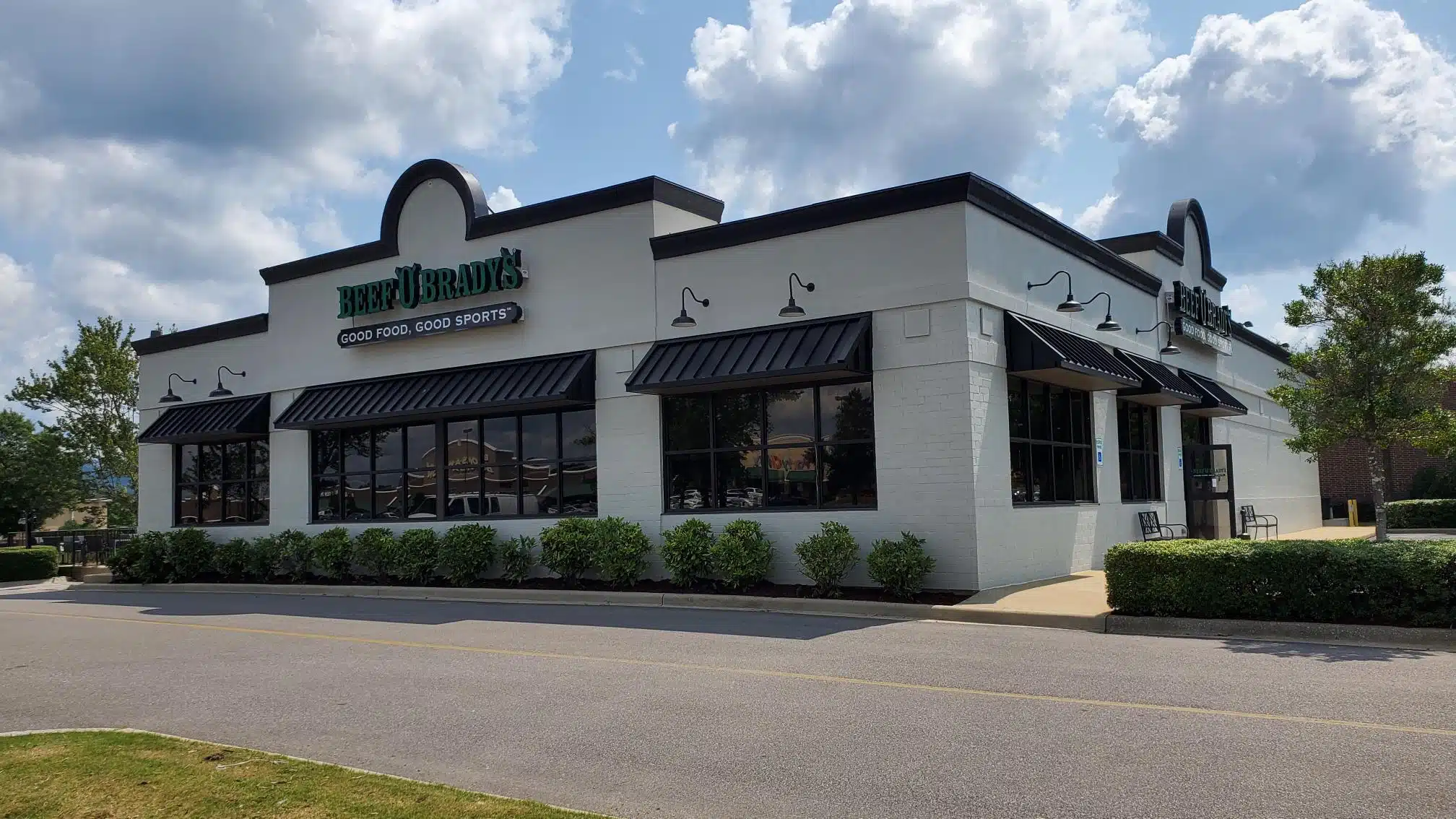
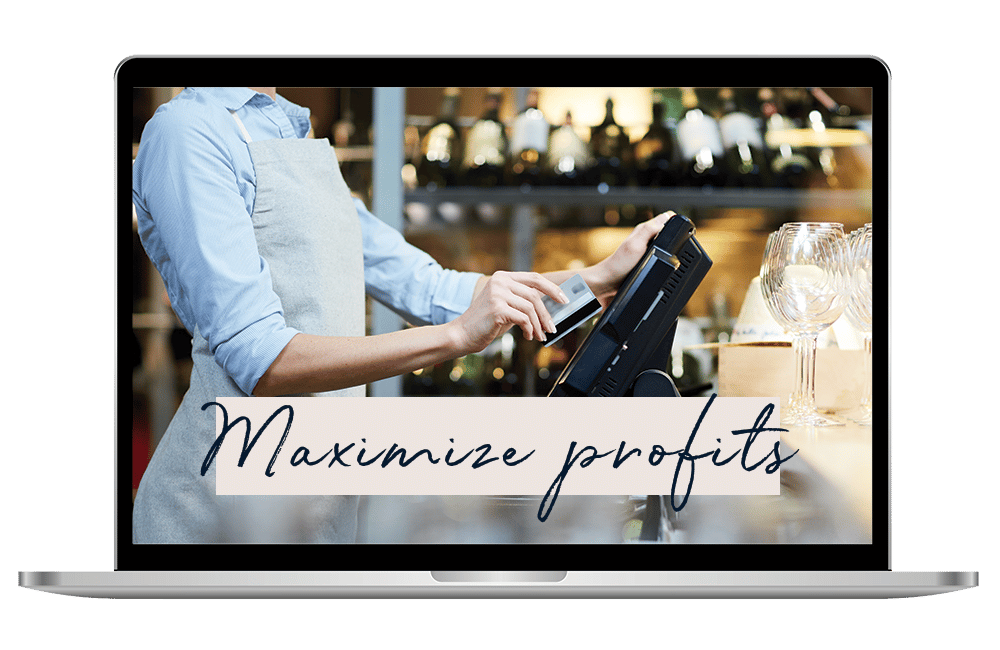
The three costly mistakes you could unknowingly be making?
Find out in this FREE guide and restaurant assessment specifically designed to reveal the unexpected hurdles standing between you and exponential business growth.
Thank You To Our Sponsors
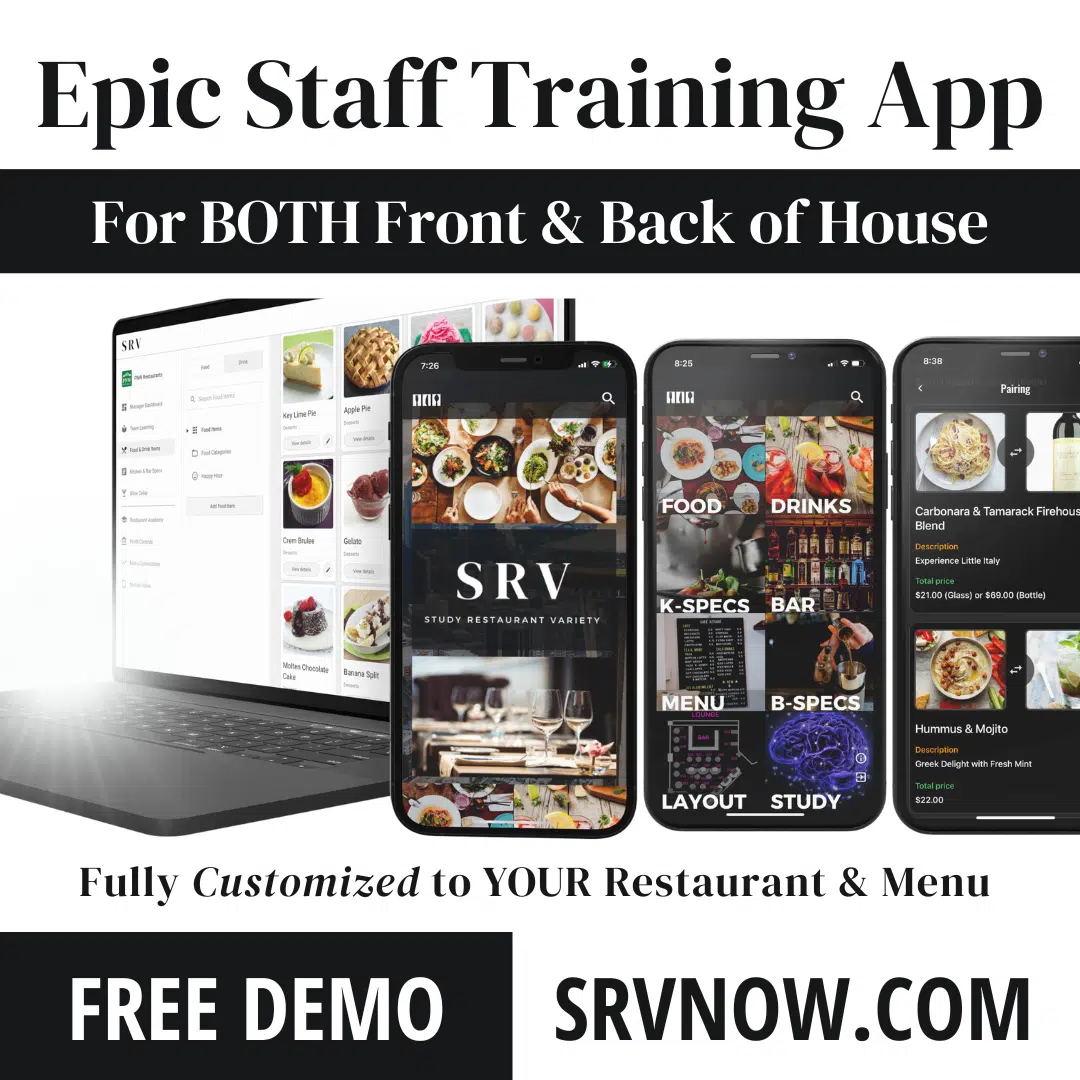

The Employee Retention Tax Credit We will help you determine your eligibility for 2020 & 2021 - Get Started
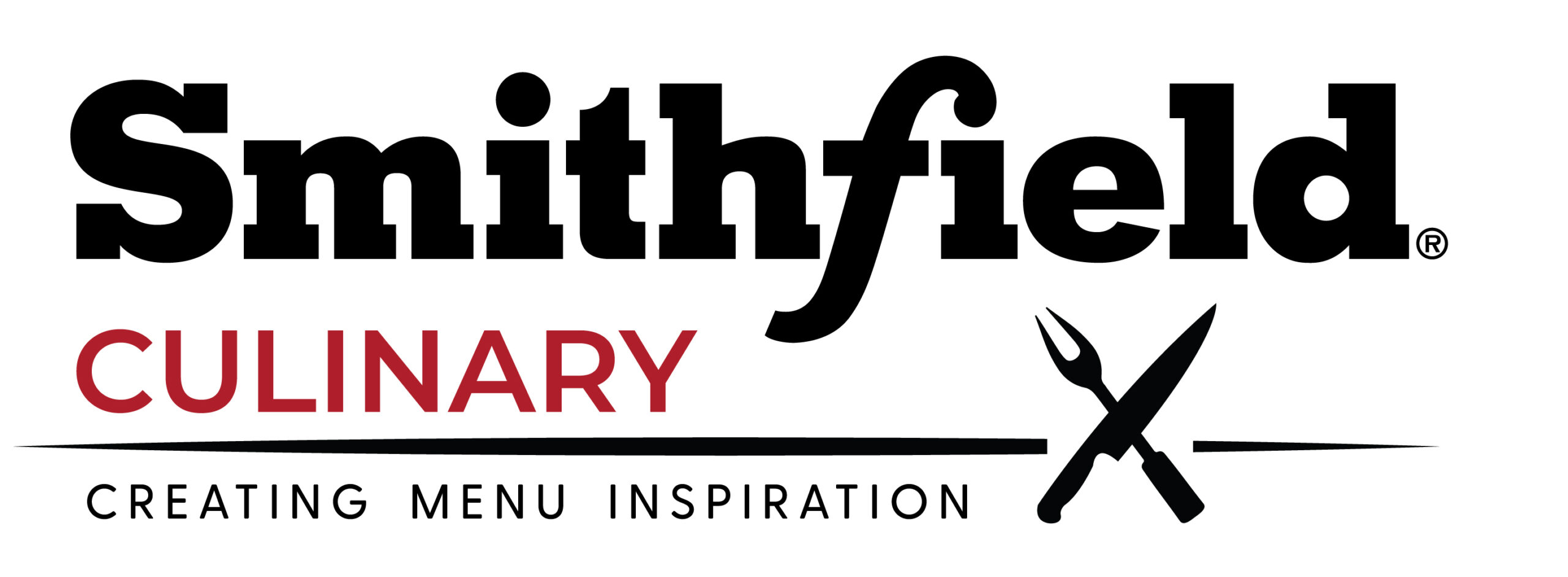
Inspiring Head-Turning Menu Creativity
Culinary Trends & Chef Inspired Recipes - Learn More
Want to become a podcast sponsor?
Please get in touch with Roger at roger@restaurantrockstars.com
